Oil vs Gas furnace for your home in Los Angeles or Ventura county, the better heating system for your house!
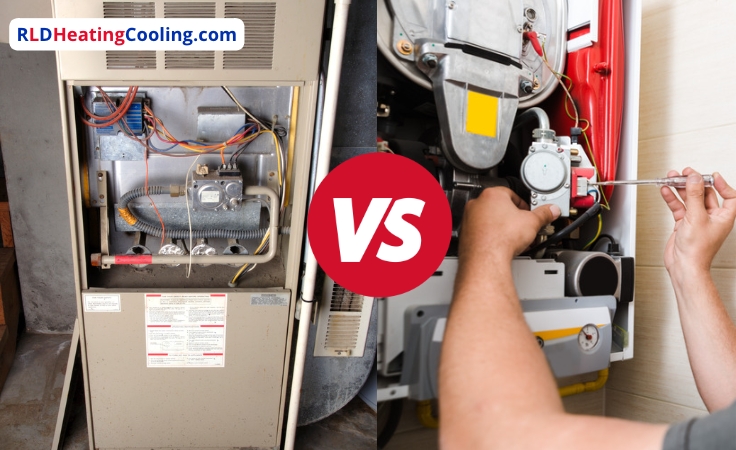
People have started considering suitable house furnaces with the temperature dropping into single digits or even below.
And if you have an existing furnace that is not functioning well, go for furnace repair near me or get in the line for the new system.

call 818-210-6669
Contact 24/7 our scheduling department today
Some consider oil heating as the best others are enthusiastic about gas furnaces.
If you consider converting your existing system from one fuel to another, remember that it is more complicated than it seems.
Both oil and gas furnaces use fuel to warm the space. However, the heating fuels are different from each other.
However, both systems have advantages and disadvantages, which we will discuss in this blog.
We will thoroughly discuss both systems, get an in-depth comparison and determine which is better.
So, without a wait, let’s start!
5 Factors to consider while getting a new heating system
When purchasing a new home heating service, knowing the primary fuel as much as possible is better.

Apart from that, there are other factors that you must consider before moving on with the system.
Here are some of those factors about oil and gas furnaces (1)
Oil vs Gas furnace factor #1: Fuel characteristics
As the name says, Oil furnaces function on oil and Gas furnaces use natural gas as their fuel source.
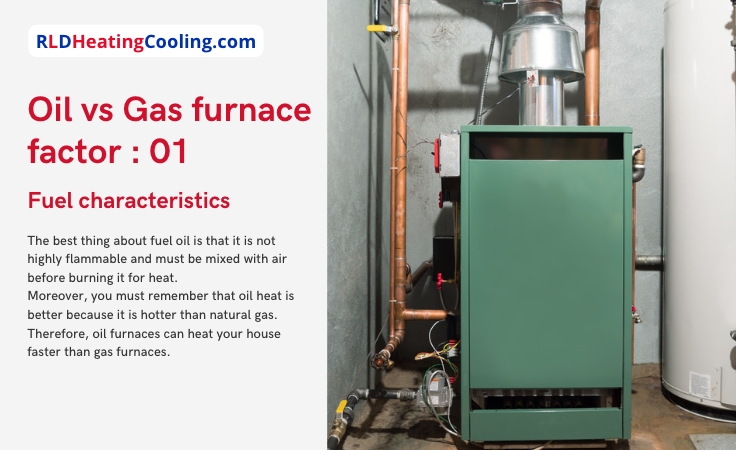
Natural gas is a common type of fuel and is readily available.
All you need is a gas supply line connection. This way, you can always have easy gas availability until all your utility bills are paid.
Though natural gas is flammable, it has been safely used as a heating fuel for many years.
Oil or better to be called fuel oil, is also a common source of heating fuel. But, the critical issue is that you must order it in quantities per your need.
It is mainly stored in a tank in and around your building.
You must monitor the amount of oil to ensure you don’t run out of it.
The best thing about fuel oil is that it is not highly flammable and must be mixed with air before burning it for heat.
Moreover, you must remember that oil heat is better because it is hotter than natural gas.
Therefore, oil furnaces can heat your house faster than gas furnaces.
Also, the heating oil consumes less heat with less condensation because of how fast they are. So your furnace can enjoy an extended life.
Oil vs Gas furnace factor #2: Cost
If you have a tight budget that you have to follow while investing in a new furnace, then the oil furnace is a better choice.
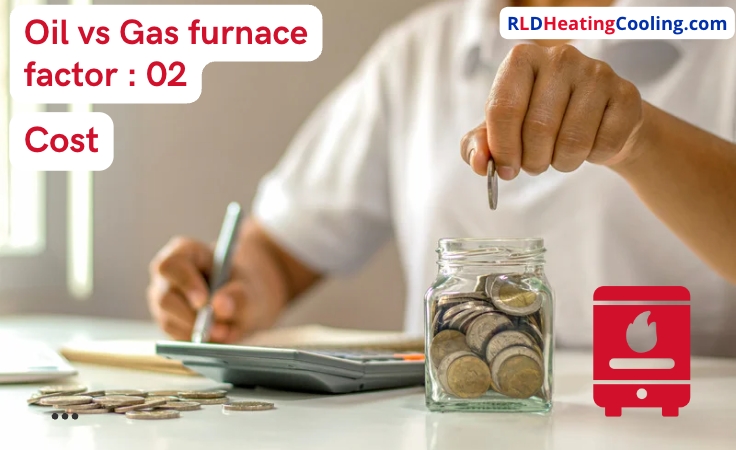
The reason is that oil furnace systems cost less than gas systems.
In both systems, if you go for higher efficiency systems, it will cost more than the low-efficiency ones.
However, the oil system requires a tank to store the fuel. So, if you’re thinking of switching from natural gas furnace to a heating oil furnace, it might be an expensive option.
Also, other parts need to be removed or shifted, like HVAC ducts, chimneys, plumbing, removal of tank storage etc., which can escalate the conversion cost.
Therefore, you must consider these factors before making a decision.
If you’re choosing a new furnace installation, it is likely more efficient than your previous system.
Modern furnaces have higher Annual Fuel Utilization Efficiency (AFUE) ratings, with the newer furnaces having around 98.5% ratings.
AFUE ratings indicate the amount of energy in the fuel the furnace burns, which is turned into usable heat. For example, an AFUE rating of 90% reveals that 90 percent of fuel efficiency is utilized while 10 percent is lost.
In terms of fuel cost, oil prices fluctuate regularly, even over the course of the heating season.
On the contrary, natural gas prices remain stable.
Oil prices usually depend on petroleum prices, which is why people prefer gas furnaces more because of the stability of fuel prices.
Oil vs Gas furnace factor #3: Safety
Since natural gas is highly flammable, there are many safety concerns around it. A gas leak can lead to dangerous fire or explosion in case of gas ignition. Fuel oil doesn’t pose such a hazard.
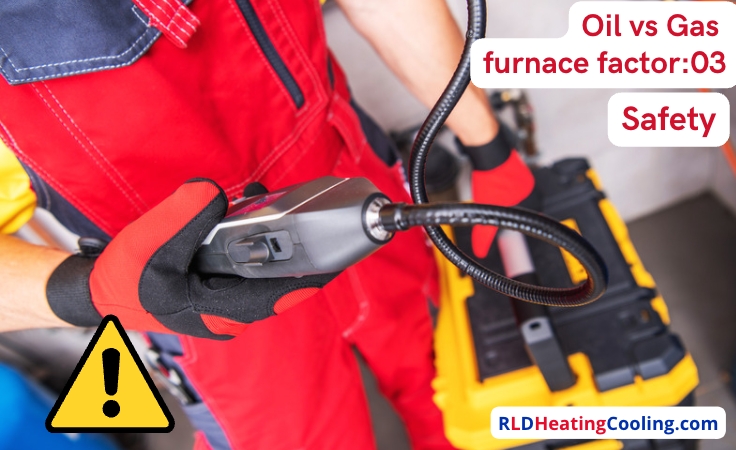
You must get a gas furnace installation from a professional HVAC contractor to ensure that all safety precautions and factors are considered and taken care of.
All in all, be it gas or oil leakage, both can have hazardous results and will require specialized attention and maintenance.
Also, burning both fuels causes carbon monoxide emission, so both furnaces must be appropriately vented to prevent carbon monoxide poisoning.
Oil vs Gas furnace factor #4: Maintenance
Regarding heating system maintenance, the oil or gas furnace’s vent or chimney flu should always be clean and leak-proof as it is part of the furnace from where the combustion is blown out.
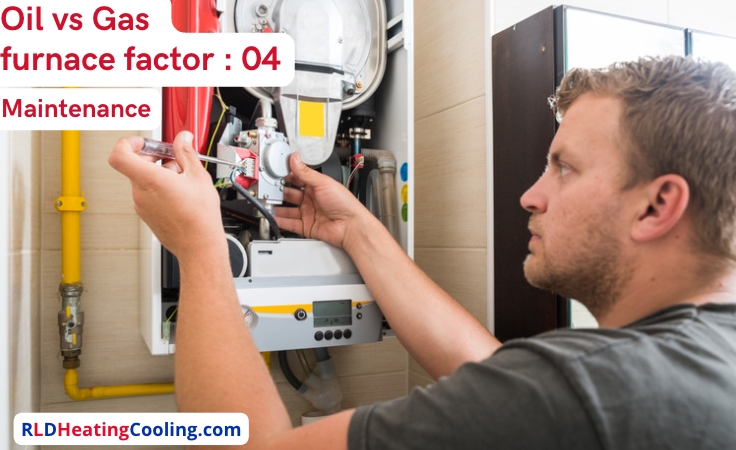
These components shield against the toxic fumes going back into your house and provide effective combustion.
The gas and the oil furnace have air handling equipment, a burner and a heat exchanger. However, oil furnaces also have a pump that pushes the fuel to the furnace system.
Both systems also have air filters, so all these parts and filters need to be cleaned and replaced periodically to maintain the system’s efficiency.
Oil vs Gas furnace factor #5: Lifespan
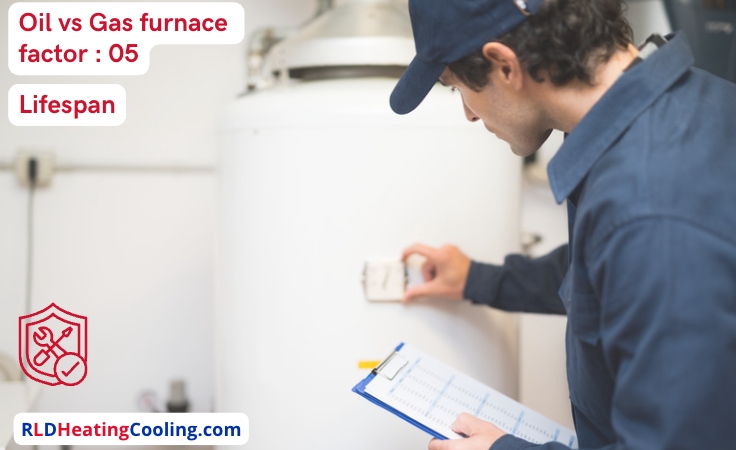
An oil furnace can last around 30 years or more. However, persistent repair and maintenance can extend its life even longer.
On the contrary, gas furnaces can last nearly 15 to 20 years, but regular maintenance and repair can enhance their shell life a bit longer.
Pros & Cons of Oil Furnaces
Oil furnaces are suitable for places with frigid temperatures.
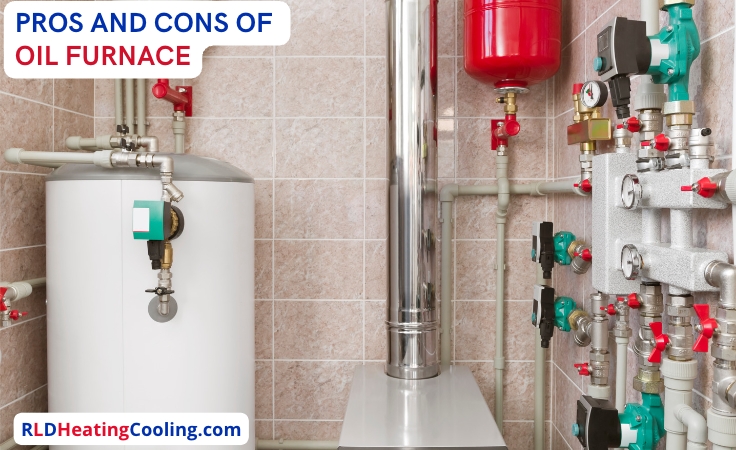
Here are some pros and cons of Oil Furnaces:
Pros
The pros of Oil furnaces are:
- Easy availability: Oil is readily available, and that too in reasonable quantities. Also, the proper infrastructure for its delivery is available almost everywhere. So, you can rely on oil furnaces easily.
- Heat production efficiency: Heating oil burns hotter compared to natural gas. So you get better warmth at the same or even lower prices.
- Longer lifespan: An oil burner has a lifespan of about 25-30 years, almost double that of gas burners.
- Cost: Oil furnaces are affordable compared to gas units as the gas units are priced at 10% to 20% higher than the oil ones.
- Safety: Natural Gas leaks have been a potential cause of death. Though accidents are rare, they should be considered before deciding what type of furnace you should get. Heating oil doesn’t carry any risk of leakage or explosion.
Cons
The cons of oil furnaces are:
- Storage: As a fuel option, oil is messy compared to gas fuel and involves storage issues.
- Maintenance: Heating oil furnaces need more maintenance and cleaning than gas systems.
Pros & Cons of Gas Furnaces
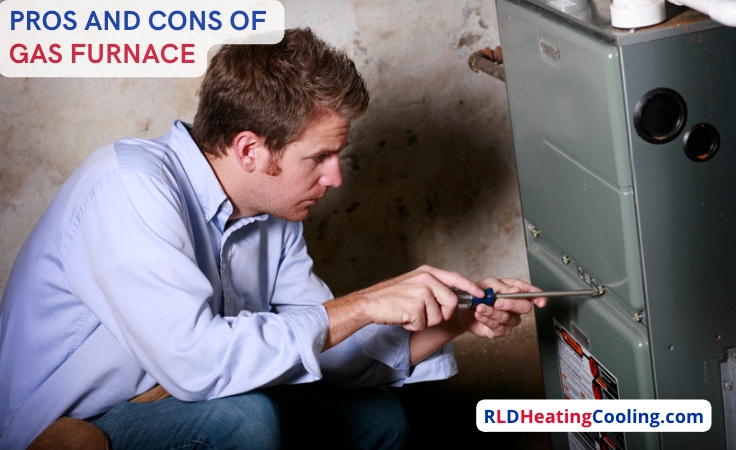
Gas furnaces are traditionally the first preference for homeowners living in populated areas, as there is almost always an HVAC service company to take care of the lines.
Pros
- Less maintenance: Gas furnace does not need much maintenance or repair services throughout its lifespan.
- Affordable: Heating oil prices can fluctuate wildly and are affected by many factors that have nothing to do with oil supplies. However, gas supplies and prices are more stable and better suited for places that often need furnaces.
- Reliable: Gas fuel is reliable because your local utility company takes care of the lines and supplies. So you don’t have to fret about refilling the tank, as in the case of oil furnaces.
Cons
Some cons of Gas furnaces are:
- Environmental impact: Most gas furnaces use energy since they run at total capacity or are entirely shut off.
- Poor air quality: If the air filters are clogged, the gas furnace can blow out dust particles into the air, degrading your home’s air quality.
Furnace installation & replacement services at RLD
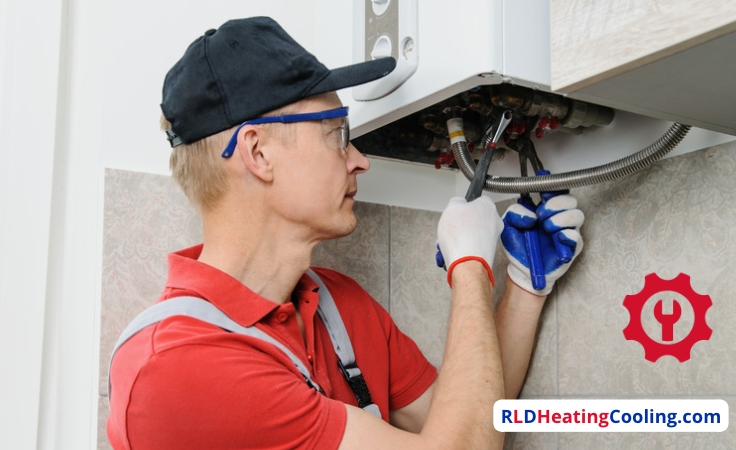
As you can understand, there are both some advantages and disadvantages of owning an oil furnace or a gas furnace. By knowing in and out about their functioning and your needs, you can easily decide which system will fit your house.
However, if you still need clarification and help with HVAC Los Angeles, we at RLD heating and cooling services will help you. Our licensed HVAC contractors will provide you with guidance and assistance based on your needs. Call to book an appointment.
FAQs
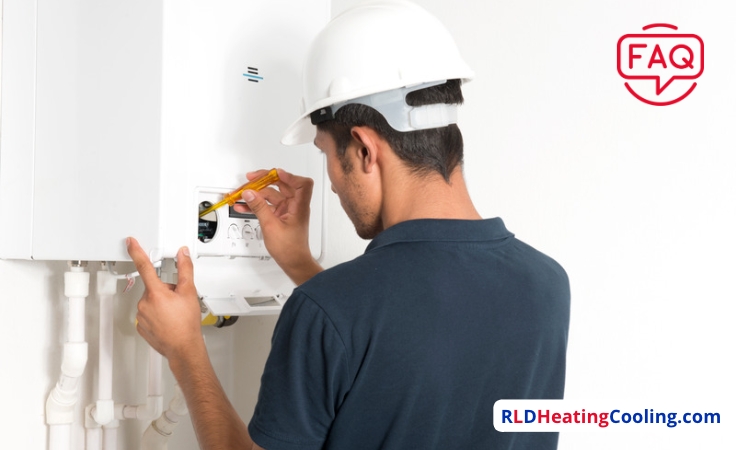
Here are some of the questions people usually ask:
Oil vs. Gas Furnace FAQ #1: What are the disadvantages of oil heating?
Some disadvantages of oil heating or burning oil are:
- Oil is expensive compared to gas.
- You need an on-site tank to store the gas.
- Constant usage can lead to dirt buildup, so you must maintain it regularly.
- Less efficient as compared to gas furnaces.
Oil vs Gas Furnace FAQ #2: Is it worth switching from oil to natural gas?
The most important benefit of switching from oil to natural gas furnaces is that gas was cheaper than oil in fuel, installation, and maintenance costs. However, it went up
Gas furnaces used to be better efficient than oil ones as they use less energy, helping you save on heating bills. However, this is not the case anymore. The best solution probably would be installing heat pump.
Oil vs Gas Furnace FAQ #3: What are the pros and cons of an oil furnace?
The pros of oil furnaces are:
- Better safety
- Long lifespan
- Heat production efficiency
- Better equipment efficiency
Cons of oil furnaces are:
- Environment impact
- Unstable prices
- Regular maintenance
- Storage issue
Oil vs Gas furnace FAQ #4: Is oil better than gas heating?
On average, the life expectancy of an oil furnace is 30 years or more if it is properly maintained, while the life expectancy of a natural gas furnace is only 11-14 years.
The efficiency rating of a new heating oil system ranges from 83% to 95%.
Also, you get plenty of hot water supply with heating oil.

call 818-210-6669
Contact 24/7 our scheduling department today
Our Address is
RLD Heating Cooling
8040 Deeting Ave #5
Canoga Park CA 91304
Opening hours
Monday 8 am – 8 pm
Tuesday 8 am – 8 pm
Wednesday 8 am – 8 pm
Thursday 8 am – 8 pm
Friday 8 am – 8 pm
Saturday 8 am – 8 pm
Sunday 9 am – 5 pm
